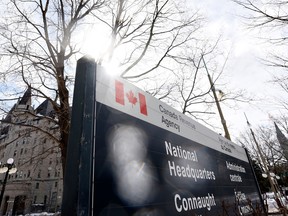Jamie Golombek: CRA’s reasoning for denying headhunter expenses full of contradictions, judge says
Reviews and recommendations are unbiased and products are independently selected. Postmedia may earn an affiliate commission from purchases made through links on this page.
Article content
Much of the discussion concerning the tax deductibility of employment expenses over the past three years has focused on what employees who have been working from home due to COVID-19 can write off on their tax returns. But it’s also important to remember that other non-reimbursed employment expenses, beyond those related to your home office, may also be tax deductible.
Advertisement 2
Article content
To be entitled to deduct employment expenses, you’ll need to get a copy of a properly completed and signed Canada Revenue Agency Form T2200, Declaration of Conditions of Employment, on which your employer has certified you were required to pay various types of expenses for which you will not be reimbursed.
Article content
You’ll also need to complete and file a copy of Form T777, Statement of Employment Expenses, with your tax return. This form lists examples of potentially deductible employment expenses, which can include: accounting, legal, advertising and promotion fees; allowable motor vehicle expenses; certain food, beverage and entertainment expenses; out-of-town lodging expenses; parking; and postage, stationery and other office supplies. But this list is not exhaustive, and, occasionally, the CRA may challenge your claim if a particular expense is unusual, large or not on its list of traditional employment expenses.
Advertisement 3
Article content
That’s exactly what happened in a recent tax case involving a Quebec wealth-management adviser who was employed at a major bank-owned brokerage firm from 1997 until her retirement in 2019. The taxpayer during her testimony described the nature of her work, which included assessing clients’ needs, investing their money and estate planning. Although the taxpayer resided in a small town about an hour’s drive outside Montreal, she had clients throughout Quebec, as well as in Ontario and Nova Scotia. As a result, she incurred travel expenses that were not paid for by her employer, and which the CRA fully allowed.
In 2015 and 2016, the adviser reported commission income on her tax returns of $538,388 and $527,077, respectively, and deducted employment expenses of $31,051 in 2015, and $39,435 in 2016.
Advertisement 4
Article content

The CRA allowed the majority of her employment expenses, including promotional, motor vehicle and travel expenses, but it denied costs she paid to a headhunter to help find an appropriate associate adviser to join her practice. Specifically, the CRA denied $11,112 in 2015 and $10,606 in 2016.
By way of background to justify the headhunting fees, the adviser explained her performance evaluation was based on several things, the most important of which is the amount of commissions she earned, which was primarily based on bringing in “net new assets.” She stated her net new assets during 2014 and 2015 were “clearly insufficient.”
At that time, she concluded that if she wanted to achieve the performance expected by her firm, she needed to hire an associate adviser who could share her duties and canvass for new clients. This was confirmed by her brokerage branch manager, who testified that when an adviser’s clientele becomes larger, it can be difficult to ensure the quality of services, and that in these cases the firm suggests senior advisers hire associates.
Advertisement 5
Article content
To this end, the brokerage firm posted the associate adviser position internally, but the posting produced few candidates, so the taxpayer was asked to search on her own. It was at this juncture that she decided to hire a search firm to find a suitable associate to join her team. That new associate adviser joined in October 2017. Documents produced in court showed that the hiring allowed the adviser’s commissions to grow by increasing net new assets to the firm.
The CRA denied the adviser’s cost to hire the search firm, arguing the taxpayer wasn’t explicitly required under her employment contract to pay the headhunter expense. The CRA said the taxpayer should have gone through the internal recruitment process and selected someone from that list rather than using her own headhunter.
Advertisement 6
Article content
The judge found this to be nonsensical: “This seems illogical to me since (the brokerage manager) confirmed that the internal process … had not been productive.”
The judge also said the CRA was somewhat contradictory in its approach toward the taxpayer’s employment expenses. The CRA clearly acknowledged the taxpayer “had to incur most of the expenses,” and allowed all of them except for the executive search firm fees on the basis that the taxpayer was not required to incur “this” expense. Furthermore, the CRA admitted during questioning that its argument was essentially that the employer’s requirement to pay “other expenses” was not specific enough to include headhunter expenses.
-

CRA taken to court after denying spousal support payments as tax deductible
-

Taxpayer tries to claim parking costs as medical expense, claiming discrimination for travelling short distances
-

The CRA is cracking down on COVID-19 benefit payments as this taxpayer found out
-

Massive TFSA recontribution mistake puts taxpayer in CRA’s crosshairs
Advertisement 7
Article content
The judge disagreed. She turned to Question 1 of Form T2200, which indicated the adviser was required to pay the expenses incurred to perform the duties related to her work. “In my view, this is sufficient to conclude that the (taxpayer) meets the condition set out in (the Income Tax Act)” to deduct employment expenses, the judge wrote.
Finally, the CRA attempted to argue that the fees paid to the headhunter were capital in nature and, therefore, not deductible. It argued this on the basis that it was a one-time expense. Again, the judge disagreed and concluded the costs incurred in finding an associate adviser were current expenses and not capital expenses.
Having met the conditions in the Tax Act to deduct employment expenses, the judge ordered the matter be sent back to the CRA for reconsideration and reassessments on the basis that the adviser is entitled to deduct the amounts paid in 2015 for 2016 for headhunting fees since they clearly fell within the expenses described as “business development,” and thus were expenses which the adviser had to pay and for which her firm provided no reimbursement.
Jamie Golombek, CPA, CA, CFP, CLU, TEP, is the managing director, Tax & Estate Planning with CIBC Private Wealth in Toronto. [email protected].
_____________________________________________________________
If you liked this story, sign up for more in the FP Investor newsletter.
_____________________________________________________________



